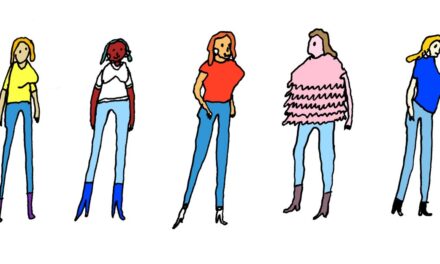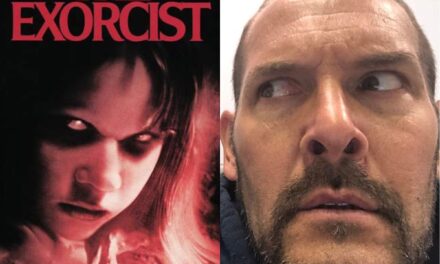As a Latina, Belén Preciado never saw anything wrong with her eyebrows. The 15-year-old described them as “very bushy and thick eyebrows, you know.”
“I’m like, very hairy from my parents,” said Preciado.
Growing up, people would often compare Preciado to Mexican artist Frida Kahlo because of Kahlo’s unibrow. But the comparison was not a compliment, quite the opposite.
Those comments were microaggressions of discrimination and racism because of the way Preciado looks.
Microaggressions that Latino youth, especially young Latino women face when it comes to body image.
“I never understood why it was such a wrong thing because Frida Kahlo is so beautiful and she’s such, like a beauty of art,” said Preciado. Kahlo was not afraid to defy the societal norms for women and beauty.
Reedley College freshman Kiara Valenzuela said that not only throughout her whole high school career at Edison High School had she faced microaggressions but her entire education career.
“There are some points where you’re met with racism, like, not just very visible, but like microaggressions,” said the 18-year-old Valenzuela. “In the Latino community, a lot of us women have more body hair than the usual like white women or any other race. And then they comment on that. And it’s a microaggression.”
Preciado said she got constant comments on her “hairy body” in elementary and middle school.
“People just pointed out my hairy arms and my hairy upper lip. I had, like, a little mustache and they were just like, pointed out,” Preciado said. “I would feel super insecure about it because I know girls that were like, did not have hair at all. And I was like the only girl in my class who had hair like on my body.”
Preciado, whose family is from Colima , México, said most of the girls, including those of Mexican heritage, in her classroom had lighter skin tone than her too.
But going to a high school where most students are people of color, hasn’t shield Preciado from microaggressions when it comes to her physical appearance.
Preciado started her junior year at Edison High School , which has a minority enrollment of 91 percent.
“I don’t know if this kid thought he was going to be funny or like, making some type of joke, but he was just ….,” Preciado said of her eyebrows being the center of that student’s joke during her sophomore year.
His microaggression made Preciado feel “very confused. I was a little bit hurt.”
Preciado didn’t want to make the incident a big deal when it happened and just ignored that person.
“We are supposed to be like mature now,” Preciado said.
She realized it was not that important because Kahlo “was a beautiful person. And it’s like, honestly, an honor to be compared to her because she made history,” said Preciado.
Looking back, Preciado said she would change her response, “I’d be like, ‘Oh, thank you. It’s an honor to be compared to her.’”
“I don’t know why people think it’s funny (making fun of someone’s physical appearance). I just don’t understand because, most Latinas and Latinos, I know that we can relate to being hairy and having a lot of beautiful, thick hair around our body,” Preciado said. “I think it’s a beautiful thing to have.”
Dealing with racism
But how could young Latinos overcome the hardship of discrimination, racism, bullying (including social media) that many people of color face in the Valley during a time when hate crimes and discrimination against minorities in the state is increasing.
Valenzuela said “the media plays a huge part in how other people view Latinos as well. Then they’re forced stereotypes like you see on TV, movies, shows, and like even through social media, like TikTok , Instagram, Snapchat and all that.”
Valenzuela said sometimes when she spoke in Spanish, she would get comments like “‘I don’t understand. Can you speak like in English?’” or she would be made fun of because she stutters.
While the perpetrators doing the microaggressions might think those comments doesn’t affect the individual who is at the end of those comments, Valenzuela said “they can affect the person because then their individuality is affected.”
Valenzuela added that younger people are more vulnerable to microaggressions as they grow up and try to fit the cultural norms or fit a stereotype instead of being “your own type of person. You don’t have to be able to fit what their image is. You’re your own image. Be yourself.”
Preciado said she feels schools are doing all they can to stop discrimination and bullying, especially when it comes to social media.
“I feel like it’s the person who isn’t owning it. I feel like that’s the problem. But I do feel like school counselors need to reach out to students just to make sure that nothing is going wrong just with online bullying and stuff like that,” Preciado said. “It’s the responsibility of the person bullying or doing the action of it because they’re not owning up to it.”
Valenzuela said while schools try enough by making sure they hold assemblies on bullying, students would still make those comments regardless.
“The school should be making sure like don’t discriminate against someone else. If you don’t want them to discriminate against you or they’ll make fun of someone else or like my comments, something like a microaggression,” Valenzuela said.
Valenzuela said some people might not be aware that they are committing microaggressions.
“Let them know and let them be aware. Like they should take ethnic study classes like Chicano studies or African studies or like ethnic studies in general,” Valenzuela added.
For young Latinos who don’t feel empowered to speak up for themselves when facing bullying, racism, or discrimination or any form of microaggressions, Preciado have this advice: “Tell an adult or a person you trust.”
“First thing first, I would tell an adult or any person you trust, and I would make sure that the adult you’re telling is you’re comfortable with so that they can do something about it,” Preciado said. “Because if you feel very shy about telling someone, then they can definitely do something about it.”
“My advice to them is like they are not alone. I hope they know that they’re not alone. And if they want to speak up, I encourage them to speak up. And if they feel like they’re not able to speak up or not safe, situation wise, then then they should know they’re not alone,” Valenzuela said.
“Surround yourself with people that you feel safe and comfortable with,” Valenzuela said. “Stay strong mentally. You know, like what’s right and what’s wrong and do not pay attention to those comments or racism or microaggressions that they face. It may be hard. But you have to keep going forward.”
This is part of a series on Stop The Hate, a project funded by the California State Library .



